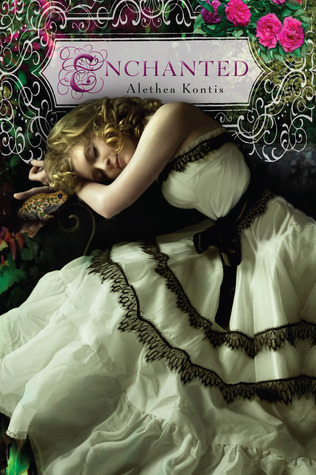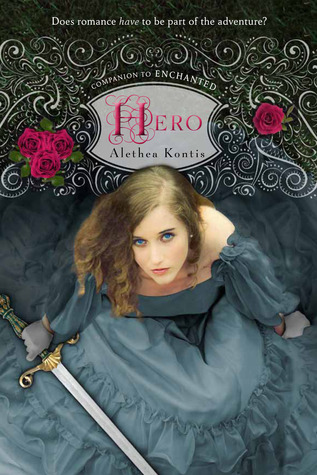Monday’s child is fair of face,
Tuesday’s child is full of grace,
Wednesday’s child is full of woe,
Thursday’s child has far to go,
Friday’s child is loving and giving,
Saturday’s child works hard for a living,
But the child who is born on the Sabbath Day
Is bonny and blithe and good and gay.
This rhyme opens Enchanted, the first in a series of the tales of the Woodcutter sisters. When we first meet them, Sunday, the seventh daughter of a seventh daughter, is out in the Wood, writing stories in a journal. She meets an enchanted frog named Grumble, and the rest, as they say, is history.
Alethea Kontis hooked me in quickly with the easy conversational tone of Sunday’s encounter with Grumble. The Princess and the Frog is a fine story, and I would have been content enough to read a straight retelling, even if it hadn’t gone anywhere new. Imagine my delight, then, when Kontis delivered something more.

In the first few pages, we learn that Sunday’s oldest brother Jack is something of a legend, but that he was cursed sometime ago to become a dog. We also learn more about the other Woodcutter children. Monday married into royalty early, Tuesday danced herself to death in red shoes, Wednesday is a poet, Thursday ran off with a pirate king, Friday is a charitable and compassionate soul, Saturday is a tireless worker, and Sunday (in addition to being bonny and blithe and good and gay) is a storyteller whose stories come true. There are also two other boys, Peter and Trix, the former of whom seems nice and not terribly remarkable in this book, and the latter of whom is a foundling child, and half fairy. It quickly becomes clear that we are in not one fairy tale, but a magical mashup land, where many fairy tales overlap, and there are generous side helpings of politics, adventure, and magical rules.
When Grumble transforms into into his true form of Prince Rumbold, he expects that, as in the usual course of fairy tales, Sunday will fall in love with him, but things aren’t so simple. Jack’s curse came about because of the prince, and her family is none too happy with him. It’s hardly a spoiler in such a tale to admit a happy ending is in store; it’s how the story gets there that makes things interesting.
Enchanted is full of fun and interesting characters and subplots, and one of its strengths is in the ensemble nature of the narrative. The Woodcutter family is big and loving, and they feel quite real because all of them are flawed. Seeing the siblings interact in playful and supportive ways, as well as in argumentative and annoyed ways, makes the time spent in their tower house feel familiar and cozy. We also get to visit the castle, and see both heated battles and dazzling balls. Overall, for anyone who has enjoyed things like Once Upon A Time, Robin McKinley’s fairy tale retellings, and Patricia C. Wrede’s Enchanted Forest Chronicles, Enchanted is bound to be a pleasure.
Hero, book two in the Woodcutter series, is a harsher story. Saturday’s personality is not so sparkling as Sunday’s, and her story is not so sparkling, either. When she accidentally summons an ocean in her backyard, she finds herself swept away on an adventure, which ultimately takes her to an enchanted mountain where a witch is keeping a dragon bound in sleep.
There were things I really liked about this book, and things that left me a bit adrift. Hero sees Saturday do a lot of work. I mean, A LOT. Like, imagine a lot of work, and then multiply that by about a hundred, and you might begin to get the picture. Saturday is very literally a strong female character. One of the things I liked about it was getting to go into her head and see how this superhuman work ethic shaped her personality. She’s intensely stubborn, practical, and modest. She’s also very angry, which is a neat thing to see as a driving force in a young female protagonist.
Hero also pokes a bit at gender roles, as the male romantic lead, Peregrine, has been cursed to live a long life in disguise as the daughter of the witch. He wears skirts and pretends to be a girl for the majority of the book, and even when he’s not pretending, he’s not as physically strong as Saturday. Add to the mix that Saturday is stuck pretending to be her brother Jack, and we get a cross-dressing romance of epic proportions.
Which leads me to one of the things I didn’t love about Hero. The book’s front cover asks, “Does romance have to be part of the adventure?” A good question, which Saturday asks herself in the middle of the book, and which I kept wishing had any possibility of being answered with a resounding, “No.” That Hero was destined to be a romance from the start undermined the question, I felt.
Saturday has to defeat the witch, rescue the prince (okay, he’s just an earl’s son, but still), and escape the mountain, which is a pretty tall order. In the meantime, she also has a lot of subterfuge and physical toil to get on with. All of which leaves little time for falling in love, even if that was something she was interested in doing. Unfortunately, it felt a bit too much like the mere fact that Saturday and Peregrine were theoretically compatible given their ages and genders was enough to make them soulmates. Granted, Peregrine had apparently been dreaming about Saturday for all his life, but that didn’t mean the inverse was true.
The book also felt a little like it suffered from sophomore series syndrome, spending a fair amount of time setting up intrigue and events for later books in ways that didn’t quite feel naturally woven into the main story for this volume. The bulk of the story felt like something from a different kind of series, one more focused on epic fantasy than fairy tale mashups. It was a good story, but it felt a bit jarring juxtaposed with Enchanted‘s mix ‘n’ match quirky fun.
Still, the book has plenty to recommend it. There are some fascinating supporting characters, including a chimera named Betwixt (great name!), and the witch’s familiar, Cwyn. We also get an in person glimpse of pirate queen Thursday, and some more general Woodcutter family time. The satisfying sibling support is still present when Saturday is not off isolated in the mountain, and we get to have a deeper look at Monday’s character, which is rewardingly complex. The setting up work is also tantalizing, suggesting there’s a lot more adventure to come in future Woodcutter stories, and that many things are not necessarily what they first seemed.
Overall, although Hero was not quite as delectable as Enchanted, I enjoyed both of them, and am eagerly awaiting the next Woodcutter installment, Dearest, which should hit the shelves next fall.








